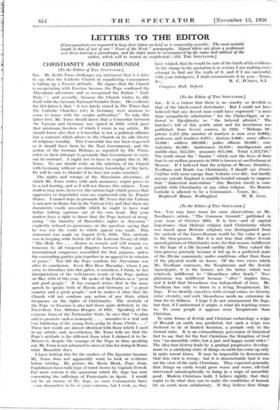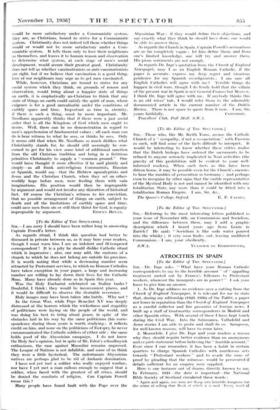[To the Editor of THE SPECTATOR.]
your issue of October 30th. It is true—and of capital importance—that Hebraic. religion (and Christianity which was based upon Hebraic religion) was distinguished from the outlook of the Greco-Roman world by the value it gave to the time-process. But it is not true that either Jewish apocalypticism or Christianity were, for that reason, indifferent to the hope of a life beyond earthly life. They valued the time-process precisely because it led up to a perfected state of the Divine community under conditions other than those
of the physical world we know. Of the two views which Mr. Needham contrasts, the Neoplatonic and the Jewish Apocalyptic, it is the former, not the latter, which was relatively indifferent to " blessedness after death." Neo- platonism was indifferent because " after " implies time, and it held that blessedness was independent of time. Mr. Needham has only to listen to a living Neoplatonist, Dr. Inge. If we identify ourselves with eternal values we thereby enter eternity, and such blessedness needs no extension - in time for its fullness. I hope g I do not misrepresent Dr. Inge, but that, if I understand it, aright, is what his teaching comes to. To some people it appears more Neoplatonic than Christian.
In some forms of Jewish and Christian eschatology a reign of Messiah .on earth was predicted, but such a reign was declared to be of limited- duration, a prelude only to the eternal state. . It is an extraordinary perversion of historical fact to say that for the first Christians the. Kingdom of God was "no unearthly order, but a just and. happy social order.? The idea that history leads by a gradual progressive develop. rnent to a satisfying state of things on earth has come up only in quite recent times. It may be impossible to demonstrate that this .view is wrong.; but it is demonstrable that it was not the view of the early Christians. They expected generally that things on earth would grow worse and worse, till -God intervened catastrophically to bring in a reign .of unearthly good. Modern .Christians hold, I. believe rightly, that they ought to do what they can to make the conditions of human life on earth. more satisfactory. -If they believe that things
would be more satisfactory under a Communistic system, they are, as Christians, bound to strive for a Communistic system. Christianity does not indeed tell them whether things would or would not be more satisfactory under a Com- munistic system. It tells them only to love their neighbours as themselves, and leaves it to human reason and observation to determine what system, at each stage of men's social development, would secure their greatest good. Christianity does not tell us whether vaccinationists or anti-vaccinationists are right, but if we believe that vaccination is a good thing, love of our neighbours may urge us to get men vaccinated.
While, however, Christians are bound to strive for any social system which they think, on grounds of reason and observation, would bring about a happier state of things on earth, it is emphatically un-Christian to think that any state of things on earth could satisfy the spirit of man, whose exigence is for a good unrealisable under the conditions of earthly space and time. Important as time is, eternity, if there is such a thing, must be more important. Mr. Needham apparently thinks that if there were a just social order that is all the Kingdom of God which men ought to desire. Well, there can be no demonstration in regard to men's apprehension of fundamental values : all each man can do is bear witness to what he sees, or thinks he sees. Only it seems odd that when Mr. Needham so much dislikes what Christianity stands for, he should still seemingly be con- cerned to get for his view some kind of additional sanction from the old Christian tradition and bring in a fictitious primitive Christianity to supply a common ground." One would have thought it more effective if he said plainly and simply—as all frank anti-religious Communists, Russian or Spanish, would say—that the Hebrew apocalyptists and Jesus and the Christian Church, when they set an other- worldly hope before men, were feeding them with vain imaginations. His position would then be impregnable by argument and would not involve any distortion of historical fact. Of course the Christian's witness to his conviction, that no possible arrangement of things on earth, subject to death and all the limitations of earthly space and time, could save men from sin or still their thirst for God, is equally















































 Previous page
Previous page